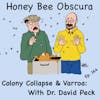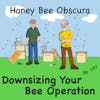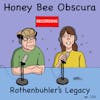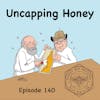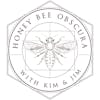Considering Packages or Nucs for the Spring (051)

Will it be packages of nucs next spring? It’s only December, how do I know what I’ll want, and, if any, how many I’ll want? Getting nucs or packages in the spring has changed a lot in the last several years. The quality of queens has changed....
 Will it be packages of nucs next spring?
Will it be packages of nucs next spring?
It’s only December, how do I know what I’ll want, and, if any, how many I’ll want? Getting nucs or packages in the spring has changed a lot in the last several years. The quality of queens has changed. Everybody has varroa, well almost everybody, so how and when do I treat these new entries into my apiary?
How many of what I have now will still be here next spring? What if they all are? Or what if none are? And where can I get packages now? The post office used to deliver. That’s gone. Used to be a bee supply outfit up the road, but they don’t do nucs, only packages. And how much will they cost? If I can find some?
 An overwintered nuc with an overwintered queen is probably the best bet for making it to next fall, and I might make some honey, too. But is that queen overwintered, or brand new? And how much time and money will it cost me to get a package established next summer if it doesn’t rain until August, or it doesn’t quit raining until next August? Do I have the time, and the money?
An overwintered nuc with an overwintered queen is probably the best bet for making it to next fall, and I might make some honey, too. But is that queen overwintered, or brand new? And how much time and money will it cost me to get a package established next summer if it doesn’t rain until August, or it doesn’t quit raining until next August? Do I have the time, and the money?
Gotta figure this out pretty quick, because the suppliers are already telling me they will run our fast next spring. Get your order in now, or maybe go without.
Listen as Kim & Jim discuss the pros and cons of Packages and Nucs!
___________________
We welcome Betterbee as sponsor of today's episode. BetterBee’s mission is to support every beekeeper with excellent customer  service, continued education and quality equipment. From their colorful and informative catalog to their support of beekeeper educational activities, including this podcast series, BetterBee truly is Beekeepers Serving Beekeepers. See for yourself at www.betterbee.com
service, continued education and quality equipment. From their colorful and informative catalog to their support of beekeeper educational activities, including this podcast series, BetterBee truly is Beekeepers Serving Beekeepers. See for yourself at www.betterbee.com
______________________
Honey Bee Obscura is brought to you by Growing Planet Media, LLC, the home of Beekeeping Today Podcast.
Music: Heart & Soul by Gyom, Walking in Paris by Studio Le Bus, original guitar music by Jeffrey Ott
Copyright © 2021 by Growing Planet Media, LLC

Episode 51 – Considering Packages or Nucs for the Spring
[Music]
Jim Tew: Kim in my beekeeping lifetime, getting packages, ordering packages has really changed. COVID, lithium batteries on airplanes, all things unrelated to beekeeping has changed the way I get my packages.
Kim Flottum: Well then there is nucs too, that's changed.
Jim: That's a good point. The backup plan for getting a nuc has changed. It's that time of the year. It's time to order our packages or our nucs. Let's talk about it, Kim. Hi, I'm Jim Tew.
Kim: I'm Kim Flottum.
Jim: We're coming to you from Honey Bee Obscura. Well, today we want to talk about package and nucs and the fact that it's time to be ordering and preparing to install those things. Again, Kim, again, it's that time of the year.
Kim: Yes. This year's discussion is different than the one we had last year.
Introduction: You are listening to Honey Bee Obscura, brought to by Growing Planet Media, the folks behind beekeeping today podcast. Each week on Honey Bee Obscura hosts, Kim Flottum and Jim Tew, explore the complexities, the beauty, the fun, and the challenges of managing honeybees in today's world. By engaging in informative discussion meant for all beekeepers, long timers, and those just starting their journey with bees. Sit back and enjoy the next several minutes as Kim and Jim explore all things honeybees.
Kim: The world has changed and it's going to change even before next spring.
Jim: Yes, it does.
Kim: How many are you getting this year?
Jim: Oh, I hate that. How many am I getting this year? You see right now, can we tell that it's early December? We're making plans for what we'll be doing in early May? Kim, what I usually do is I look at my bee life. How many bees do I have now, how many bees do I want next May. If I could just give you the honest number, I'll probably order from three to five packages and then I'll probably get a couple of nucs and that'll be just enough to add to what I over winter and go from there. What's your guess? What are you doing?
Kim: I'm probably going to order two of something, maybe one of each two packages, a package and a nuc or two nucs, depending on what I can get, where and how much they're going to cost me. I don't want any more than four or five colonies in my backyard. If the two that I got through this summer make it through the next spring, then I'll have four. If they make it through next spring, I'll have at least two. Then there's the cost, these things aren't free.
Jim: Boy. That's the truth. You and me being old, there's no reason to remember when, everything costs more, but I remember when they were just “regular expensive”. I understand, Kim, do you want to control Varroa, do you want to deal with all the headache of shipping packages? It's an expensive undertaking now. It's not just these people getting greedy. It costs that much to do it.
Kim: You speak of Varroa? Here's one of the bigger changes in life. You get that package, do you treat it for Varroa the day you get it?
Jim: No, I don't. I've wondered, should I? Because right at that moment, there's no brood. If you're using something like oxalic acid I don't think you use drugs, do you? Chemicals?
Kim: No. I don't. I do sugar.
Jim: If I treat them with oxalic acid right then, that would be exactly the right thing to do. Why would I put them through that if they just went through that before they were shipped? I don't know that. Is that something I should ask the supplier? I never have before. Is that something I should ask the supplier? When's the last time you treated these bees for Varroa? Do they need it now or did you do it?
Kim: He's going to say, it's your call.
Jim: I don't want to hear that answer, Kim.
Kim: Even if he tells me, even if he says I treated them about two hours ago and they should be clean as a whistle. Because I don't use poison, I'm going to use powdered sugar. I'm going to powder sugar, the heck out of that package before I ever take them out of the box that they come in. Then I'll let them sit there for a day and clean up that sugar and then I'll do it again. I've found over the last few years that that gets rid of a lot of mites if there are a lot of mites to get rid of. Most often I'll have maybe one or two and so I'm figuring there's probably 8 or 10 left in there someplace.
Jim: Yes. 8 or 10 mites. Right?
Kim: Right. I give them a powdered sugar shake, doesn't hurt the bees, it gives them something to eat, and I sleep better at night.
Jim: Well, I don't know that I ever sleep well at night when I've got packages being installed, Queens contained, money invested, advice given, wife convinced. Where do you see sleeping soundly on all of this?
Kim: You bring up a good point in terms of queens. That too is changing. It used to be that you got the queen that the package producer raised himself or herself. That's what you got. It was Italian or Carniolan or a rogue, and that's pretty much what you got. Now that's changed. You can get pretty specific on what kind of a queen you want, then take it the next step. What's the hardest thing about installing a package in terms of longevity? It's how does the queen do.
Jim: Right. She's like getting a puppy, isn't she? You might get a breed of a dog that you really want, but you still get a bum dog out of the deal. Then you're stuck with that dog until you can find somebody else to give it too. In a way, bees are like that. You never really know what that queen is going to do till she gets the chance to show you. If she doesn't pass the test…..-
Kim: You've invested a bunch of time and energy and resources-
Jim: -and that's it.
Kim: -into her hoping she'll produce. Meanwhile, there's nothing coming along because she wasn't laying or hardly laying. The population of the colony, the population of the package is decreasing, decreasing, decreasing, decreasing. It's time to get a new queen and then you go another period without any brood being produced and pretty soon it's the 4th of July.
Jim: You just explained why even before Varroa, before everything, that the recommendation was always to buy two packages. That way you've got one package maybe to correct what the other package did wrong. I still cling to that, if you can afford it at least buy two, that way, if one queen is bad, maybe the other queen can carry a double package load build up faster. Then you can split it back out the 4th of July and still have your two colonies there.
Kim: Yes, or take some brewed from the package that's producing and share it with the package that isn't and let them raise a queen themselves. It's iffy. It's always iffy, and bees are just really good at making you guess.
Jim: That's why when you have a good year, you should really brag about it, because you were just blind lucky. I mean, you control some mites and you put supers on, but really the queen, you got the weather pattern you got, the lack of insecticides around you. That was all beyond your control. When you have a good year boast about it, and then stay real quiet in those years when you took a hit.
Sponsor: Betterbee is pleased to sponsor today's episode of Honey Bee Obscura Podcast. For over 40 years, Betterbee has supplied beekeepers across the country with the tools, equipment, and knowledge needed to succeed. Because many Betterbee employees are beekeepers themselves, they understand your needs and challenges and are better prepared to answer your beekeeping questions. From their colorful catalog, to their support of beekeeper educational activities, including this podcast, Betterbee truly lives up to their tagline of beekeepers serving beekeepers. See for yourself at betterbee.com.
Kim: Even if you get a package and I'm going to talk about nucs a little bit here in a minute because they're important in my operation. A package, you put a lot of work, you spend a lot of time, a lot of money getting it up to winter -- What do you want to call it? Winterizing health. How much honey, did you get off that package?
Jim: How much honey did I get off the package?
Kim: Yes.
Jim: Oh. I'm lucky if I get any honey at all off that package.
Kim: Yes. You spent a whole summer's time and a whole summer's resources getting a package ready to hopefully make it through the winter. That's why I look at nucs. Nucs you got a little bit of a head start, but there's a trick here with nucs. This is, you got to know you producer. Is the queen in that nuc a brand-new queen that he stuck in there an hour before you got there to pick it up, or has she been with that nuc all winter long?
Jim: Buying packages of bees is like buying apples and then saying, "I'm tired of apples, I think I'm going to buy some oranges." Because it's a totally different taste, different fruit, different concept. When you buy nucs, Kim I completely agree. Who are you buying them from? How did they winter over? If you're a nuc producer, and you're sitting here right now in early December predicting what you'll be able to sell next May, you're out on a limb. Me, the purchaser, needs to have confidence in my nuc supplier that they're good enough at what they do that I can get some bees in a nuc next spring, and then you're exactly right. You get brood, you don't have that population collapse, and they build up faster, they build up stronger. If you got good queens, here we go again, with the good queen thing again?
Kim: I like working with nuc producers, and long ago and far away when I actually made some nucs to sell, it's really long ago and far away, but when I made nucs to sell, I made them up in late summer. This was before Varroa was an animal to have to deal with, but that's -- The perfect time now to make up a nuc is late summer so that you can get rid of the Varroa going into winter. If I was planning on selling, say 6 or 10, I made up 15 or 18 nucs and coming out in the spring I had maybe 10 or 12. It's a bell curve, and you lose some on one end, but you plan on that and you end up with just a little bit more than you need and those are the ones that you expand on.
Jim: I took a shot at that, like you said years ago, young man, energy, eagerness, but I tried-- those were the days, what happened? I don't have any of those days left. But I wintered nucs, and I did the 50% thing. I had about half of them survive, and then you build on those, but it just seemed to be a top-heavy loss. I can lose 40% in the winter with Varroa, or I can try to winter nucs and lose 50% either way, I'm losing a lot of bees on this whole thing.
If you could take all those big summer colonies and split them and get a new queen into it, get them through the winter, what a glorious thing it is. When you were in Medina Ohio, pack them up, put them on the back of a truck, haul on the North Florida let them sit in this nice warm weather all year, then go back and pick them up. All you got to do is just ride hours and hours and hundreds of miles to do all that.
Kim: Let's see. Let me think about that a minute.
Jim: You don't have to think about it, no we're not going to do it. Every year Kim, at this time, here it is, it's time to decide what resources do we want for our beekeeping season upcoming. Should you be booking packages? How much equipment do I have? Is it ready? Am I good to go? Can I find somebody to sell me the nucs? How big are the nucs going to be? Everything is a question, isn't it?
Kim: When you raise your nucs, Jim, where do you get your queens for them? You let them raise their own? Like late summer split and you let them raise a queen that goes over winter? Do you get queens from somebody in the late summer and put them in? Or do you put them in in the spring?
Jim: Is that a rhetorical question, or are you asking me what I did all those years ago when I was young and eager? Okay. When I was young and eager, we made splits and then initially the split was a queen mating nuc. Then once it had a good queen laying on it, I don't have a good queen, just a queen laying, you try to build those up and that's what wintered over. Now the rhetorical question would be if I'm doing this as a living, I would probably try to find someone to sell me the queens. Is that possible? Do I know someone? All of that's another big “if”, if you can find someone to provide the queen so I can make splits off my colonies and then I install the Queen.
Kim: I ended up towards the end of doing all of that, is buying summer queens from suppliers usually California. Those queens were well mated, they were healthy, and I could get them at the right time. I was comfortable with those queens because of all of those factors. A spring queen? It's a shot in the dark if she's going to be mated a, and b if she--
Jim: You're depending on spring drones, aren't you? That's a totally separate situation.
Kim: The other thing is, if you're making late summer splits and that queen doesn't take, you're not going to lose that split you're just going to take those bees and spread them out with the rest of the bees that you got out there. You're not losing anything, other than the price of that one queen that you lost, but you're not going to lose a nuc.
Jim: Well, I'm pretty much confused now Kim, should I buy packages or nucs? That's why every year I buy some of both just to spread the confusion. That way I can hopefully build something up enough to survive and fight with Varroa and then see what I can get through the winter again.
Kim: The thing with packages is they start slow, and they build slow and there's not a rush. If your life is not rushing any more then a package isn't a bad idea, but if you've got the energy and the time and the resources to rush, you're probably going to look at a little more maturity in that colony and you're going to get a nuc.
Jim: We always started by saying everything had changed, and I'll come to a close at that point. Everything has changed. As a younger man without Varroa, I would have raised queens, and made my own splits. In this day and age, the headache of controlling Varroa, getting colonies strong enough, not knowing if you're going to have the drone population, raising queens, and then having colonies left to split - that’s an overload Kim, that's too much on me. I would probably try to find somebody to buy the queens from with the cost of that to add to it.
Kim: I think I'll come down in your place and watch, see how you do this.
Jim: We'll just watch videos, but that's all I'm going to do is find somebody else who's done it and watch them do it too. Then I'm just walking by the packages or the nucs. I always love beekeeping. I'll have bees from somewhere.
Kim: They won't be the same.
Jim: Well, thanks for talking about it. Thanks everybody for all the people who listen to this pod.
Kim: You gave me a lot to think about again.
Jim: All right. Well, stay in touch buddy. We'll try it again sometime.
Kim: All right. Take it easy.
Jim: Bye, bye.
[00:17:08] [END OF AUDIO]
New to Honey Bee Obscura Podcast?
Here are some great episodes to start with. Or, check out episodes by topic.









